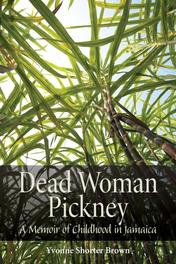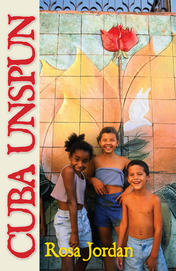Caribbean & West Indies


Excerpt from the Prologue, Dead Woman Pickney: A Memoir of Childhood in Jamaica by Yvonne Shorter Brownd
My body signifies many stories. My female body, which is to say my brain, my heart, my soul, my flesh, my physiognomy, and my spirit, all are marked by events of the past into which I was born. It is the past of the colony of Jamaica, New World slavery, plantation economy, and English missionary education, set within the culture of the British Empire as it flourished and faded. A long past, yet my body remembers. This was the realization I came to when I was brought, at last, to question how I came to be born in Jamaica and how, in particular, I came to have this body that, by no will or permission of mine, caused so many moments of disruption and discomfort in multicultural classrooms and workplaces.
Multicultural discourse—how calm and irreproachable the expression—was for me an inviting door, one through which I believed I might easily pass in the search for understanding. And so my inquiry began, on my own behalf first, and then on behalf of African and “black” students. It was a simple quest for knowledge with which to make informed curricular and pedagogical interventions. During the course of my reading and reflection, I discovered the racial, economic, and sexual collision of Africa, Europe, and the Americas that—incredibly—had made me one among millions of coloured, mulatto, quadroon, octoroon children, the fruit of “black” virgins, Ewe, Ashanti, Twi, Guinea, Yoruba, Hausa, and Ibo, deflowered by white men. The “deflorescence” I speak of was no ordinary sexual act of biological maturation. It was the deliberate racialized sexual assault whose purpose was domination. White men from Portugal, Holland, Spain, France, Denmark, and England ravished the African women as they, simultaneously, plundered the African landscape for its gold, diamonds, iron, salt, gums, cloves, coffee, copper, leopard skins, rhinoceros horns, and, especially, for its ivory—the white and the black (the harvesting of black bodies became known as black ivory in the slave trade).
The harvesting of black ivory depopulated the continent, destroying clans, tribes, kingdoms, and nation-states. The rape of the healthiest and most beautiful women was relentless. It started at the point of capture and sale; it continued in the barracoons that were spread along what became known as the Slave Coast of Africa as well as within the officers' quarters in the slave castles. 1 We can imagine the sexual assaults, by white men and black, within the confines of the slave ships that plied the triangular trade, especially along the Middle Passage, and, thereafter, in the great houses of the plantations. Sexual assaults continued as an integral part of the violence that controlled and enforced labour in the tobacco fields of Virginia and Kentucky; in the cane fields of Barbados, Jamaica, Cuba, Puerto Rico, and Haiti; and in the rice fields of the Carolinas. White rape of black took place over a period of more than 350 years. For 250 of those years, it accompanied the legal trade in African bodies, and then it continued for another century of legal African chattel slavery, in what the Europeans conceived of as the New World.
My physiognomy is the living record of this terrible lineage. My mother is the descendant line of Africa enslaved: taken from the Slave Coast, a place unknown in origin, but probably somewhere that would have been known to my paternal descent—English and Scottish colonizers— as the Guineas or Ghana. I cannot be sure because too much of this lineage is lost or hidden. This, at least, I have direct experience of because my father's family hid my maternal lineage from me. In the same way, the knowledge regimes of schooling have, for the most part, hidden the facts and truth of the history of brutality against Africans from those who, like myself, have good reason to learn them. I struggle daily to heal the scars of wilful ignorance and epistemic violence that silence the history of enslavement in this, the so-called, New World.
I was born as a by-product of those in the service of empire in the colony of Jamaica. I grew up hearing that Africa has no history; Africa has no culture; “black” people were made to serve the white man. I continue to hear derogatory assertions about Africa. Africa is the Dark Continent. Africa is the basket case of the world. Africa is the land of savages and backwardness.
But what did that mean to me? Jamaicans were, and fundamentally still are, categorized as black, white, and—my own kind—coloured. If I was not “white,” I was certainly not “black. ” I did not believe that assertions about “black” Africa described me, even partially. Only when I moved to Canada did I “become” black—that is, I had “blackness,” in the North American sense, bestowed upon me. Only through living and working in British Columbia, and observing and experiencing First Nations and Aboriginal peoples' struggle to reclaim their land, language, and culture from English and French colonial domination, was I compelled to acknowledge, explicitly, the parallel struggles of “black” people, whose very name, written in lowercase, reduced them to their skin colour. How more diminished can a people be? While the struggles of Africans on the continent are similar to those of the indigenous peoples of Canada, the African-descended peoples in the Americas—Canada, the United States, the Caribbean, and South America—have had to fight against the stigma of “blackness” brought about by 450 years of trans-Atlantic European trade in their enslaved bodies and some 500 years of chattel slavery and domestic bondage. The legacy of this historical, legal, psychological, social, and economic dehumanization is carried over into contemporary official documents. For instance, in reading Canadian census reports up to the 1990s I discovered that all immigrants were identified with a country of origin except for people of African descent, whose category was “black. ” How disconcerting to encounter in documents on Canadian multiculturalism a string of descriptors such as Chinese, Asian, Scottish, Irish, First Nations, Aboriginal, and black? All of these descriptors are properly related to place except black, which is placeless. As if to add insult to symbolic injury, when one uses black as a noun and capitalized, one is corrected, which reinforces the historically imposed inferior status. For me, living among people who claimed rights and entitlements based on their place-based identities, these realizations were both painful and shameful to live and work with. These people constantly reminded me that as a group African-descended peoples are regarded as marginal citizens, locally and globally. Although the relatively recent appellation African-Canadian was meant to replace black, black remains, for complicated political reasons, the adjective and the noun for peoples of the African continent and its diaspora.





